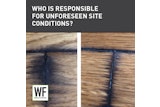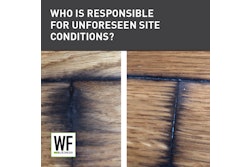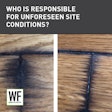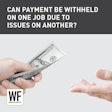
 Shutterstock.com | Evlakhov Valeriy
Shutterstock.com | Evlakhov Valeriy
Today's consumers crave interaction. As a result, there is a proliferation of blog and review sites where the consumer can talk about a business and its products or services, for better or worse.
While there are positive ways to rebuff criticism (see "10 Steps for Fixing Your Floor Business' Online Reputation"), sometimes reviewers have ulterior motives. They may seek to coerce or extort a business, or maybe they are competitors filing false reviews. Perhaps the reviewer is unstable.
This more interactive mode of communication has challenged existing laws, which were created in an era where access to publication was much more limited. Here are answers to the most common questions businesses ask when discussing legal remedies to poor online reviews.
Can you ask the website to remove the content?
Your first thought is to contact the website and demand that the false review be removed—after all, it is providing the platform for the false statement. Often that will not work, however. Many review sites have a policy of not removing any posted review, while others may require that you first prove the review is false. If the user is anonymous, it may be difficult to prove the review is false simply because you cannot even identify the supposed customer. Also, if the reviewer never actually was a customer, it becomes difficult to prove the events described never happened.
As a matter of its own reputation and to ensure consumer confidence, a review site will be resistant to removing any review. If a business can control its own negative reviews simply by demanding their removal, then consumers lose confidence they are receiving real feedback about the business, and the review site loses all value.
Can you sue the website to remove the content?
Moreover, the Communications Decency Act of 1996 protects review sites from lawsuits over content provided by a third party. In other words, if the review was created by a user and not by the review site, you cannot hold the review site responsible. Subsequent court cases have even upheld this protection when the review site is notified that the review is false and defamatory and had demands to remove it, under the theory that liability upon notice would likely cause a flood of complaints to review sites, would be a large burden on them and would have a chilling effect on freedom of speech on the Internet.
What about suing the reviewer?
You may be able to sue the reviewer for defamation. Defamation is when the reviewer publishes a false and injurious statement. There are two types of defamation—libel and slander. Libel is where the statement is published in writing and slander is where it is spoken (uttered) to a third party. While the law of defamation varies by state, broadly speaking, to prevail on your claim that a review defamed your business, you will have to show that the review contains false statements and that your business suffered a loss as a result. Some states have created by statute a concept called "defamation per se," which means that for certain types of statements the harm or loss is presumed. Typically the covered statements include those that attack a person's business or profession, false claims of a vile crime against society, or false claims that a person is unchaste or suffers from a loathsome disease.
Note that defamation requires a false statement, so a review that is entirely based upon the reviewer's opinion would be protected, as would any statement containing truthful facts, even if they are harmful or lead to inaccurate conclusions or assumptions. Also, if the statement is so blatantly false that no one would ever rely upon it (e.g., a parody), it may be protected from a defamation claim.
If you do prevail, you can recover your damages from the reviewer and have the court compel a retraction (correction) of the false statement. In some states you may even be able to get a judgment against the person for punitive damages, like a Mr. Sandless location in Long Island, N.Y., did last year (see sidebar below), though this may require some additional evidence (e.g., actual knowledge of falsity and refusal to correct or remove the false statement after demand).
How can you locate the reviewer?
To proceed with an action for defamation, you will need to locate the author of the review. For former customers this may be easy enough to do, and even if the customer didn't self-identify in the review and is otherwise "anonymous," it may be possible to discern their identity from the description in the review. If the review is anonymous and you are not able to determine their identity from your own records (e.g., a review by someone who never actually was a customer), pursuing a defamation lawsuit may be much tougher. Some review websites will not voluntarily turn over the user records and will force you to get a court order, and still others may not track or verify their user's identities. With no identifying information on the reviewer, you have no ability to serve them and thus no way to get a judgment for the defamation. It may still be possible to track down the reviewer through various methods like IP address tracking, but these procedures can be expensive and are not guaranteed to get a result.
Where should you bring the case?
When pursuing the reviewer for a defamation lawsuit, you also have to consider where that lawsuit should be brought (which state and which court), and be mindful of the statute governing the time period by which such a lawsuit must be brought. That limitations period may be as short as one year from the first date of publication.
All of this assumes that the claim is being pursued in the United States; other countries' Internet and defamation laws are different, particularly where the country does not have the same free speech protections. With the Internet, you have to bear in mind that it is a worldwide platform, so you cannot assume that your local laws apply.
While there may be legal remedies available, because those remedies tend to be slow and expensive, in most situations you will be better served by carefully managing your online presence. That means promoting your business and encouraging your customers to comment on review sites that have robust terms of use that protect the consumer as well as the business, and don't permit anonymous reviews. Then the unfavorable and defamatory review is less likely to damage your business.
Mr. Sandless Wins in CourtWinning against a reviewer in court isn't impossible. Ask Matt Gardiner, owner of a Mr. Sandless in Staten Island, N.Y. Last year, a judge ordered one of his customers to pay him $1,000 because she had written "libelous" statements on the review site Yelp. One of her reviews said Gardiner "will destroy your floors he is nothing but a liar he robs customers and promises you everything you want… he is a scam liar bulls*****r." "She can slander my business all she wants," Gardiner told a local newspaper. "She just can't slander me, and that's the problem."—A.A. |

































